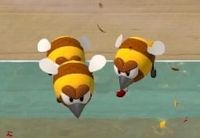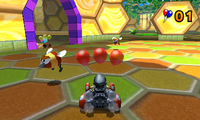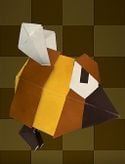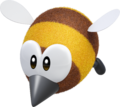Stingby
Template:Species-infobox Stingbies are bee-like enemies with their stinger located on their face. Their name is pronounced like "sting-bee".[1] They slightly resemble Diggas from Super Mario Galaxy 2.
History
Super Mario series
Super Mario 3D Land
Stingbies make their debut in Super Mario 3D Land, and are first encountered in World 2-4. They are common in levels taking place in the sky or over large pits. Stingbies fly at a certain height and cannot move up or down; rather, they patrol the area to find Mario or Luigi. When a Stingby spots Mario or Luigi, they angrily start to slowly chase after them. These enemies can be easily defeated by any form of attack.
Super Mario 3D World / Super Mario 3D World + Bowser's Fury
Stingbies reappear in Super Mario 3D World and its port in several levels. They behave the same as they do in Super Mario 3D Land. They first appear in World 1 in the level Switch Scramble Circus and later appear in Conkdor Canyon from World 2, Switchboard Falls in World 3, Piranha Creeper Creek in World 4, Deep Jungle Drift in World 6, and Rolling Ride Run and Honeycomb Starway in World Star.
Super Mario Odyssey
While Stingbies themselves do not appear in Super Mario Odyssey, mosquito-like variants known as Urban Stingbies do. They can be found in the Metro Kingdom during the night. When an Urban Stingby sees Mario, it charges at him, disappearing if it hits a wall.
Super Mario Maker 2
Stingbies appear as enemies that can be placed in Super Mario Maker 2 stages, only in the Super Mario 3D World style. Big Stingbies are generated by giving a Stingby a Super Mushroom. Stingbies chase players who are nearby, but can only move horizontally.
Mario Kart 7
Stingbies make another appearance in Mario Kart 7. They serve as enemies in the battle course, Honeybee Hive. They have a darker color than those in Super Mario 3D Land. They travel in lines through the stage and spin out any fast-moving karts they touch.
Captain Toad: Treasure Tracker
Stingbies return with the inclusion of Conkdor Canyon from Super Mario 3D World as a bonus stage in the Wii U version of Captain Toad: Treasure Tracker. Here, they behave just as they did in their previous Mario 3D platform game appearances, chasing the protagonist when they spot him. Captain Toad is able to defeat Stingbies with an airborne stomp or a well-timed spin. These enemies do not return in the Nintendo Switch and Nintendo 3DS versions since the level is not included in them.
Dr. Mario World
Stingbies appear in Dr. Mario World as obtainable assistants and are a clear reward bonus for completing the first area of World 14 and World 27. They also appear in the background of World 12 when an area has been cleared. In stage mode, their effect can only be used in timed stages, as it grants a chance that the timer is increased by 8 seconds, where the chance of activation is 30% at the first level and 80% at the maximum level (8% and 40% respectively prior to version 2.3.0). In versus mode, their effect is to grant a chance to automatically send two rows of viruses to the opponent's field when the stage shrinks to eight rows from the grey Empty Blocks, where it is a 10% chance at the first level and 30% chance at the maximum level.
Paper Mario: The Origami King
Stingbies make their Paper Mario debut in Paper Mario: The Origami King, where origami variants of them serve as enemies in Spring of Jungle Mist. Unlike their previous appearances, they can now move up and down, without being held back by a certain height.
Other appearances
In the Super Mario Mash-up in Minecraft, Bees are replaced by Stingbies.
Profiles and statistics
Super Mario 3D Land
- European website bio: "These enemies have a sharp stinger, and will try to prick Mario with it!"
Dr. Mario World
- Stage mode: Grants 30%/40%/50%/60%/80% chance of extra seconds (8) in timed stages.
- Stage mode (prior to version 2.3.0): Grants 8%/12%/20%/30%/40% chance of extra seconds (8) in timed stages.
- Versus mode: If only eight rows remain, grants 10%/15%/20%/25%/30% chance to send rows (2) of viruses to your opponent.
Paper Mario: The Origami King
| Paper Mario: The Origami King enemy | |||||||||
|---|---|---|---|---|---|---|---|---|---|
| Stingby | |||||||||
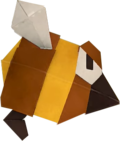
|
HP | 36 | Moves | Location(s) | |||||
| Type | Flying | Sting (?), Bumble Bump (?), Group Bumble Bump (?) | Spring of Jungle Mist | ||||||
| Item drops | Mushroom | ||||||||
| They hide in tall grass, only to fly out all abuzz like it's some kind of sting operation. | |||||||||
Gallery
The July 2019 LINE calendar
Names in other languages
| Language | Name | Meaning |
|---|---|---|
| Japanese | Bug[2] (internal) ハッチン[3] Hacchin |
English "Bug" (Super Mario 3D Land) From「蜂」(hachi, bee) |
| Chinese | 叮叮蜂 Dīngdīng Fēng |
Sting bee |
| Dutch | Stingby |
- |
| German | Summser |
From summen ("buzzing") |
| Italian | Apiciccia |
From api ("bees") and ciccione ("fat") |
| Korean | 딱끔[4] Ttak'kkeum |
From the Korean word 따끔하다 (ttakkeum-hada) which means "to sting". Possibly rhymed with the Japanese name, which also has an additional consonant next to the first one. |
| Portuguese (NOA) | Zangão |
From zangado ("angry") with the augmentative suffix -ão. It can also mean drone bee. |
| Portuguese (NOE) | Zumbida |
From zumbido ("buzz") |
| Russian | Жужжало Zhuzhzhalo |
From Жужжать ("to buzz") and Жало ("sting") |
| Spanish | Abejorro |
Bumblebee |
References
- ^ When choosing the correct answer on the second question of a Super Mario 3D World-themed skill quiz on Play Nintendo, a message is displayed saying "Yep. Sting + Bee = Stingby."
- ^ Super Mario 3D Land internal filename (Bug)
- ^ Shogakukan. 2015. Super Mario Bros. Hyakka: Nintendo Kōshiki Guidebook, pages 181 and 227.
- ^ Super Mario 3D Land official page. nintendo.co.kr. August 5, 2019, 11:10:26 snapshot via Wayback Machine. Retrieved August 28, 2020.
| Super Mario Maker 2 | ||
|---|---|---|
| Characters | Playable characters | Mario • Luigi • Toad • Toadette |
| Supporting characters | Coursebot • Worldbotb • Mr. Eraser • Nina • Princess Peach • Undodog • Yamamura • Partrick • Soundfrog • Toads • Yoshi/Red Yoshi | |
| Course elements | Game styles | Super Mario Bros. • Super Mario Bros. 3 • Super Mario World • New Super Mario Bros. U • Super Mario 3D World |
| Themes | Ground • Underground • Underwater • Ghost House • Airship • Castle • Desert • Snow • Forest • Sky | |
| Terrain | ? Block • Brick Block/Rotating Block • Bridge • Clear Pipe • Cloud Block • Crystal Block • Donut Block • Frozen Coina • Ground • Hard Block • Hidden Block • Ice Block • Mushroom Platform • Note Block/Music Block • P Blocka • Warp Pipe • Rock Block • Semisolid Platform • Slope • Spike Block • Spike Trap | |
| Items | 1-Up Mushroom/Rotten Mushroom • 10-Coin/30-Coin/50-Coin • Big Mushroom • Boomerang Flowerb • Bullet Bill Maskb • Cannon Boxb • Coin • Cape Feather • Fire Flower • Frog Suitb • Goomba Maskb • Goomba's Shoe/Stiletto • Master Sworda • Pink Coin • Power Balloonb • Propeller Boxb • Propeller Mushroom • Red POW Boxb • SMB2 Mushroomb • Super Acornb • Super Bell • Super Hammer • Super Leaf • Super Mushroom • Super Star • Superball Flower • Yoshi's Egg/Big Red Yoshi's Egg | |
| Enemies | Angry Sun/Moon • Ant Trooper/Big Ant Trooper • Unshelled Koopa Troopa • Blooper/Big Blooper/Blooper Nanny/Blooper Baby • Bob-omb/Mega Bob-omb/Parabomb • Boo/Big Boo/Boo Buddies/Stretch • Boom Boom • Bowser/Meowser • Bowser Jr. • Bully/Big Bully • Buzzy Beetle/Big Buzzy Beetle/Buzzy Beetle Tower/Para-Beetle/Heavy Para-Beetle/Buzzy Shell • Chain Chomp/Big Chain Chomp • Charvaargh • Cheep Cheep/Big Cheep Cheep/Blurp (SMW)/Deep Cheep/Big Deep Cheep • Dry Bones/Big Dry Bones/Parabones/Dry Bones Shell • Fire Bro/Heavy Fire Bro • Fire Piranha Plant/Big Fire Piranha • Fish Bone • Goomba/Big Goomba/Paragoomba/Big Paragoomba/Galoomba (SMW)/Big Galoomba (SMW)/Flying Goomba (SMW)/Para-Goomba (SMW)/ Goombrat/Kodeka Kakibō/Goombud (SMW)/Goomba Tower/Shoe Goomba/Stiletto Goomba • Hammer Bro/Sledge Bro • Hop-Chops • Horned Ant Trooper • Jelectro • Jumping Piranha Plant • Koopa Clown Car/Junior Clown Car/Fire Koopa Clown Car/Fire Junior Clown Car • Koopa Troopa/Big Koopa Troopa/Koopa Paratroopa/Big Koopa Paratroopa • Koopa Troopa Car • Koopalingsb (Larry · Morton · Wendy · Iggy · Roy · Lemmy · Ludwig) • Lakitu • Lava Bubble/Big Lava Bubble • Magikoopa/Big Magikoopa • Mechakoopab/Blasta Mechakoopab/Zappa Mechakoopab/Mega Mechakoopab • Monty Mole/Big Monty Mole • Muncher • Peepa • Piranha Creeper • Piranha Plant/Big Piranha Plant • Pokeya/Snow Pokeya • Pom Pom • Porcupuffer • Rocky Wrench • Skipsqueak • Spikea/Mega Spikea • Spike Balla/Giant Spiked Balla/Snowballa • Spike Top/Spiky Parabuzzy • Spiny/Big Spiny/Spiny Shell • Spiny Egg • Spiny Skipsqueak • Stingby • Thwomp/Big Thwomp • Wiggler/Big Wiggler | |
| Gizmos | ! Block • Arrow Sign • Banzai Bill • Bill Blaster/Bull's-Eye Blaster • Blinking Block • Bumper • Bull's-Eye Banzai/Cat Banzai Bill • Bull's-Eye Bill/Cat Bullet Bill • Bullet Bill • Burner • Cannon/Giant cannon • Conveyor Belt/ON/OFF Conveyor Belt • Checkpoint Flag • Crate • Dash Blocka • Fire Bar • Grinder • Icicle • Mushroom Trampoline/ON/OFF Trampolineb • Key/Cursed Keyb • Lava Lift • Lift/Flimsy Lift/Cloud Lift • ON/OFF Switch/Dotted-Line Block • One-Way Wall • P Switch • POW Block • Red POW Block • Seesaw • Skewer • Snake Block • Swinging Claw • Track • Track Block • Trampoline • Tree • Twister • Vine • Warp Box/Warp Box (With Key) • Warp Door/P Warp Door/Key Door | |
| Miscellaneous | Starting blocks • Stone (Story Mode) • Toad (Story Mode) • Wings | |
| Mario's moves | Charge jumpb (SMB) • Crawl (SM3DW) • Crouch • Crouch Jump (SM3DW) • Dash • Dive (SM3DW) • Double Jump (NSMBU) • Drill Spin (NSMBU & SM3DWb) • Ground Pound (NSMBU & SM3DW) • Jump • Long Jump (SM3DW) • Midair Spin (NSMBU) • Roll (SM3DW) • Slide (all except SMB) • Spin Jump (SMW, NSMBU, & SM3DW) • Swim • Triple Jump (NSMBU) • Wall Jump (NSMBU & SM3DW) | |
| Miscellaneous | Assist parts • Course Maker • Fan-made courses highlighted by Nintendo • Gallery • Glitches • Media • Mii outfits • Minigamesb (Catch & Win! • Match & Win! • Pop & Win!) • Ninji* • Peach's Castle • Phantob • Quotes • Sound effects • Staff • Yamamura's Dojo | |
| Dr. Mario World | |
|---|---|
| Characters | Dr. Mario • Dr. Peach • Dr. Bowser • Dr. Luigi • Dr. Yoshi • Dr. Toad • Dr. Toadette • Dr. Bowser Jr. • Dr. Wendy • Dr. Ludwig • Dr. Waluigi • Dr. Wario • Dr. Daisy • Dr. Baby Mario • Dr. Baby Luigi • Dr. Baby Peach • Dr. Baby Daisy • Dr. Rosalina • Dr. Luma • Dr. Donkey Kong • Dr. Diddy Kong • Dr. Baby Rosalina • Dr. Kamek • Dr. Dry Bowser • Dr. Fire Mario • Dr. Fire Peach • Dr. Roy • Dr. Larry • Dr. Fire Luigi • Dr. Fire Rosalina • Dr. Nabbit • Dr. Lakitu • Dr. Goomba Tower • Dr. Koopa Troopa • Dr. Dolphin • Dr. Baby Wario • 8-Bit Dr. Mario • Dr. Lemmy • Dr. Blooper • Dr. Boo • Dr. King Boo • Dr. Morton • Dr. Piranha Plant • Dr. Iggy • Dr. Petey Piranha |
| Assistants | Amp • Ant Trooper • Banzai Bill • Blooper • Bob-omb • Bomb Boo • Bone Goomba • Bony Beetle • Boo • Boom Boom • Boomerang Bro • Broozer • Bullet Bill • Buzzy Beetle • Chain Chomp • Cheep Cheep • Clampy • Conkdor • Crowber • Dolphin • Dry Bones • Fish Bone • Fly Guy • Fuzzy • Galoomba • Goomba • Goombrat • Hammer Bro • Honey Queen • Huckit Crab • King Bob-omb • King Boo • Koopa Paratroopa • Koopa Troopa • Lakitu • Mechakoopa • Monty Mole • Octoomba • Para-Beetle • Parabomb • Paragoomba • Peepa • Penguin • Piranha Plant • Pokey • Pom Pom • Porcupuffer • Scaredy Rat • Scuttlebug • Shy Guy • Sledge Bro • Spike • Spiny • Spiny Cheep Cheep • Star Bunny • Stingby • Sumo Bro • Sushi • Swoop • Thwomp • Urchin • Whomp King • Wiggler • Yellow Shy Guy |
| Worlds | World 1 • World 2 • World 3 • World 4 • World 5 • World 6 • World 7 • World 8 • World 9 • World 10 • World 11 • World 12 • World 13 • World 14 • World 15 • World 16 • World 17 • World 18 • World 19 • World 20 • World 21 • World 22 • World 23 • World 24 • World 25 • World 26 • World 27 • World 28 • World 29 • World 30 • World 31 |
| Items and objects | Barrel • Barrier • Boomerang* • Brick Block • Bubble • Bubble Machine • Caged coin • Capsule • Capsule+ • Capsule Blaster# • Capsule Plus • Capsule Swapper† • Cloud • Colorful Crate • Crate • Diamond • Doc Token • Door • Dust Virus • Electric Exploder • Empty Block • Exploder • Flask • Floatie Virus • Hammer • Handy Bottle • Handy Box • Heart • Ice • Ice Fan • Key • Lock Block • Muddy Coin • Pop Cannon • Rainbow Start† • Random! • Rotating Cannon • Score+ • Shell • Skill charger • Skill filler • Skill Up • Staff ticket • Time+ • Virus • Virus Coin |
| Other | Clinic Events • Fever • Gallery (models) • Mario • Skill Summits (1–11 · 12–22) • Specialists • Update history • Virus Vid |
| Paper Mario: The Origami King | ||
|---|---|---|
| Main characters | Bob-omb • Bowser • Bowser Jr. • Captain T. Ode • Kamek • King Olly • Luigi • Mario • Olivia • Peach • Professor Toad | |
| Supporting characters | Battle Lab Toad • Birdo • Canned-Food Par-tay Trio • Chef Kinopio • Dino Rhino • DJ Snifit • DJ Toad • Emcee Shy Guy • Feelin' Fungi • Fortune Toad • Gold Fish • Kanchō Kinopio • Love Toad • Master Toad • Monty Mole auctioneer • Oarsman • Ol' Grandsappy • Origami Craftsman • Princess • Rescue Squad • Sap Sisters • Sea Captain Toad • Senchō Kinopio • Small Cheep Cheep • Mini Goomba • Sombrero Guy • Toad mechanic • Toad's BBQ Foodeatery caretaker • Whispering Trees • Whistle Snifit | |
| Enemies | Folded Soldiers | Big Cutout Soldier • Black Shy Guy • Blooper • Bone Goomba • Boo • Boomerang Bro • Buzzy Beetle • Chargin' Chuck • Cheep Cheep • Co Gasagoso • Crowber • Dry Bones • Fire Bro • Fly Guy • Fuzzy • Galoomba • Goomba • Hammer Bro • Ice Bro • Jumping Piranha Plant • Koopa Paratroopa • Koopa Troopa • Li'l Cutout Soldier • Mechakoopa • Ninji • Nipper Plant • Paragoomba • Piranha Plant • Pokey • Ptooie • Rocky Wrench • Scaredy Rat • Scuttlebug • Shoe Goomba • Shy Guy • Sidestepper • Sledge Bro • Snifit • Snow Spike • Spike • Spike Top • Stingby • Stone Spike • Sumo Bro • Swoop • Thwomp |
| Paper Macho Soldiers | Paper Macho Bob-omb • Paper Macho Boo • Paper Macho Buzzy Beetle • Paper Macho Chain Chomp • Paper Macho Goomba • Paper Macho Koopa Troopa • Paper Macho Lava Bubble • Paper Macho Koopa Paratroopa • Paper Macho Piranha Plant • Paper Macho Shy Guy • Paper Macho Stone Spike | |
| Bosses | Legion of Stationery | Colored Pencils • Rubber Band • Hole Punch • Tape • Scissors • Stapler |
| Vellumentals | Earth Vellumental • Water Vellumental • Fire Vellumental • Ice Vellumental | |
| Other | Paper Macho Gooper Blooper • Mega Paper Macho Pokey • Boss Sumo Bro • Handaconda • Paper Mistake Buzzy Beetle • Paper Plane Squadron • King Olly | |
| Locations | ? Island • Autumn Mountain • Battle Lab • Big Sho' Theater • Bonehead Island • Bowser's Castle • Breezy Tunnel • Cafés • Chestnut Valley • Club Island • Diamond Island • Dress-Up Photo Studio • Earth Vellumental Temple • Eddy River • Fire Vellumental Cave • Full Moon Island • Fun, Funky, and Functional • Graffiti Underground • Hammer Island • Heart Island • Hotfoot Crater • House of Riddles • Ice Vellumental Mountain • Musée Champignon • Mushroom Island • Ninja Attraction • Origami Castle • Overlook Mountain • Overlook Tower • Picnic Road • Scorching Sandpaper Desert • Scorching Sandpaper East • Scorching Sandpaper Far East • Scorching Sandpaper Far West • Scorching Sandpaper Minor • Scorching Sandpaper West • Scuffle Island • Sea Tower • Sensor Lab • Shangri-Spa • Shogun Studios • Shuriken Dojo • Shroom City • Spade Island • Souvenir Shop • Spring of Bliss • Spring of Jungle Mist • Spring of Purification • Spring of Rainbows • Spring of Sanctuary • Sweetpaper Valley • Temple of Shrooms • The Great Sea • The Princess Peach • Toad Town • Tranquil Pipes Teahouse • Trial of Courage • Trial of Power • Trial of Wisdom • Water Vellumental Shrine • Whispering Woods | |
| Items | 1-Up Mushroom • Boot Whistle • Boots • Confetti • Fire Flower • Fire Flower Set • Fire Hammer • Flashy Boots • Flashy Mushroom • Flashy Iron Boots • Gold Boots • Gold Hammer • Hammer • Hidden Block Unhider • Hurlhammer • Ice Flower • Ice Flower Set • Ice Hammer • Iron Boots • Lamination Suit • Legendary Boots • Legendary Hammer • Legendary Iron Boots • MAX UP Heart • Mushroom • Mushroom 3-Pack • Mushroom 6-Pack • POW Block • Puzzle Solver • Rabbit Espresso • Shiny Boots • Shiny Fire Flower • Shiny Ice Flower • Shiny Hurlhammer • Shiny Iron Boots • Shiny Mushroom • Shiny Mushroom 3-Pack • Shiny Tail • Tail • Timer Extender • Toad Radar • Turtle Tea | |
| Useful Items | Baseball • Bibliofolds • Big Shell • Bone • Canned Tuna • Canned Heart • Commoner Pass • Confetti Bag • "Deep, Deep Vibes" • Diamond Jewel • Diamond Key • Faded Fire Flower • Goomba Mask • Groovier Panel • Groovy Panel • "Heartbeat Skipper" • Heavy Bag • Jungle King Mask • Key to Bowser's Castle • Key to Peach's Castle • Lever • Manhole Hook • "M-A-X Power!" • Mushroom Handle • Opened Can of Tuna • Orbs • Professor's Room Key • Red Gem • Round Jewel • Royalty Pass • Shell Stones • Shogun Studios Master Key • Shriveled MAX UP Heart • Shriveled Mushroom • Shriveled Seed • Shuriken • Soul Seed • Space Warrior Mask • Spring of Rainbows - VIP • Square Jewel • Stamp Card • Straw • Suite Key • Sun Incense • "Thrills at Night" • Triangle Jewel | |
| Accessories | Ally Tambourine • Coin Step Counter • Confetti Vacuum • Guard Plus • Heart Plus • Hidden Block Alert • Membership Card • Petal Bag • Retro Soundbox • Time Plus • Toad Alert • Treasure Alert | |
| Objects | Boot Car • Chestnut • Hint Envelope • Magic Circle • Not-Bottomless Hole • Olly Tape • Relaxing Bench • Streamer | |
| Miscellaneous | ? Blocks • 1,000-Fold Arms • Bestiary • Collectible Treasures • Fishing spot • Gallery • Glitches • Hidden Toads • Pre-release and unused content • Quotes • Shy Guys Finish Last • Songs ("Happy & Sappy" • "Go with the Flow" • "My Heart's a-Burnin'") • Staff | |
